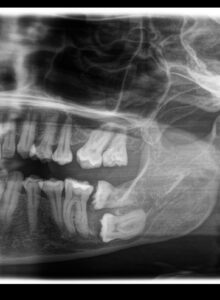When your wisdom teeth are affected, it can be quite scary. But you have to be brave to go through a treatment. You may wonder, “How can I be brave when I’m afraid?” Remember, that’s the only time a person can truly be brave — because if they aren’t, the consequences for impacted wisdom teeth can be severe.
The wisdom teeth, also known as third molars, are the last teeth to erupt. Because of this, they often don’t have enough room to grow properly. As a consequence, they may become impacted, trapped under the gum, or grow at an angle.
Example of Impacted Wisdom Tooth

One example is a horizontally impacted wisdom tooth, which lies sideways and presses against the neighboring molar. This situation, visible in many dental X-rays, highlights why impacted wisdom teeth should never be ignored.
The Risks of Leaving Impacted Wisdom Teeth Untreated
Don’t assume an impacted wisdom tooth is just a minor inconvenience. Untreated teeth can cause serious problems:
- Decay: Impacted teeth are hard to clean, trapping food and plaque. Both the wisdom tooth and the neighboring molar are at high risk of cavities.
- Infection: Gum tissue over a partially erupted tooth can become infected, causing pericoronitis. Severe infections may spread into the jaw and surrounding tissues.
- Damage to the Second Molar: Pressure on the root of the second molar can cause root resorption, bone loss, or even the loss of a healthy tooth.
- Cyst Formation: Rarely, impacted teeth can develop cysts or tumors, damaging bone and adjacent teeth.
The Risks of Removal
Extraction is often the safest choice, but it comes with risks. The inferior alveolar nerve, responsible for sensation in the lower lip and chin, lies near the roots of lower wisdom teeth. Surgery may cause temporary or permanent numbness. Other complications include swelling, pain, and dry socket during recovery.
Best Approach to Treatment
Visit a professional dental clinic in Vijayawada immediately. Dentists usually recommend:
- Panoramic X-rays or 3D scans: These show the exact position of the tooth and its proximity to nerves.
- Extraction: Removing the tooth if it causes problems or is likely to.
- Coronectomy: In some cases, only the crown is removed, leaving the roots to lower the risk of nerve damage.
- Monitoring: If surgery is riskier than leaving the tooth, dentists may monitor it with regular check-ups.
Final Thoughts
The wisdom tooth (third molar) is at high risk for decay, infection, damage to the second molar, and cyst formation. Leaving it untreated can be dangerous, but removal also carries risks. Consulting a professional from top dental hospital Vijayawada is essential — every case is unique, and a dental specialist can determine the safest, most effective plan for you.
Bottom line: If you have an impacted wisdom tooth, don’t wait for it to become a problem.


